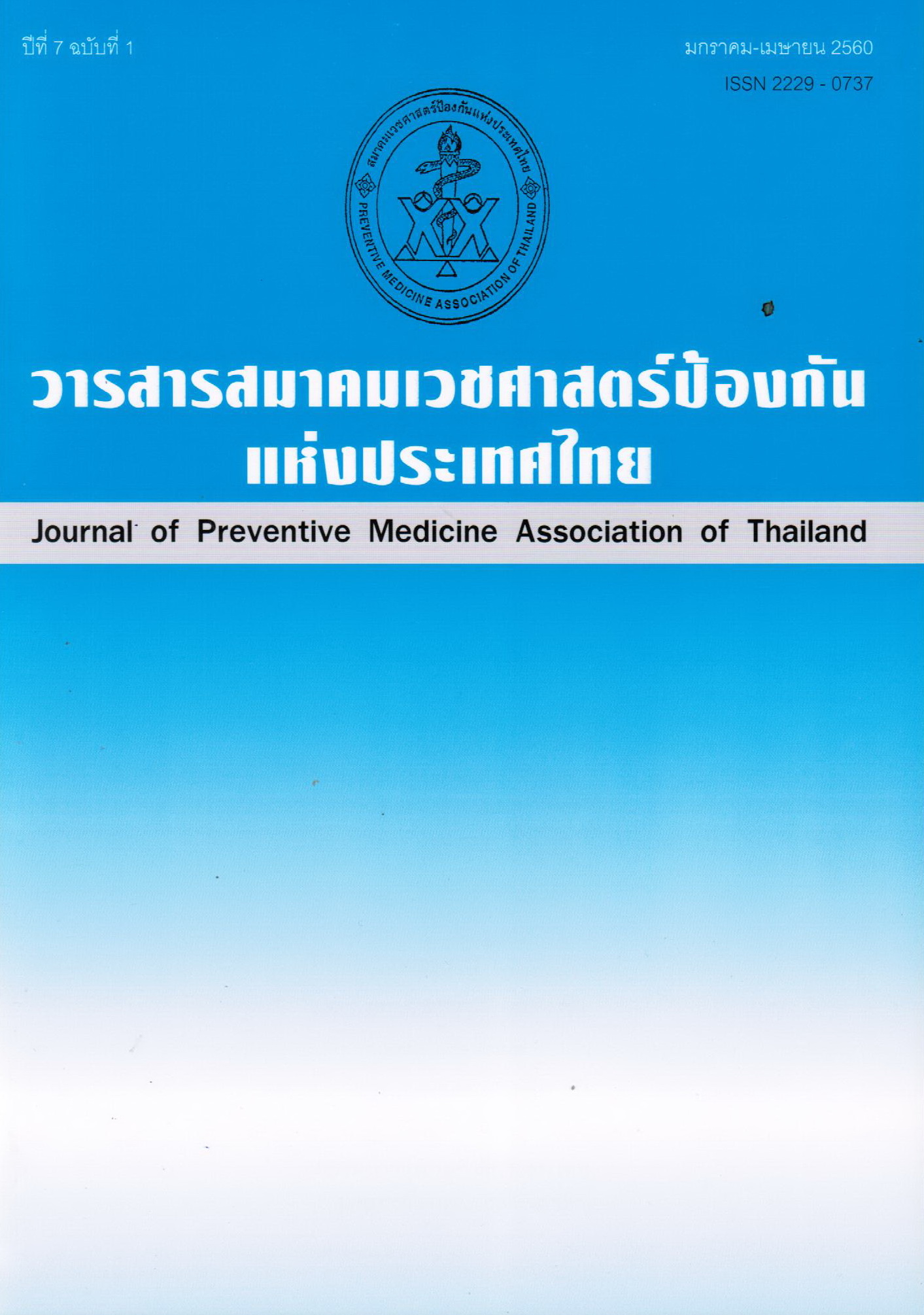The Palliative Care Outcome in Palliative Cancer Patients in Phra Nakhon Si Ayutthaya Hospital
Abstract
Cancer is reported as the first leading cause of death in Thailand. It also affects quality of life of the patients and their families. Phra Nakhon Si Ayutthaya Hospital has recently introduced palliative care service to end stage cancer patients. However, no evaluation study has been conducted yet.
This research applied inferential statistics to explain the outcome of palliative care on the selected group of cancer patients in Phra Nakhon Si Ayutthaya Hospital. Fifty cancer patients, whose palliative performance scale (PPS) 30%, were identified and selected by their primary doctors. The Thai version of palliative care outcome scale (POS) was used to all the participating patients before and after receiving palliative care. Scores were collected and analyzed using non-parametric Wilcoxon rank-sum test.
The results showed that the median total score before receiving palliative care was 19, while the one after receiving palliative care was 12.5. This reduction was statistically significant (P<0.05). Detailed examination on each question revealed that palliative care significantly impacts on pain, other symptoms, anxiety and family anxiety of the patients.
The findings suggested that palliative care can help decrease physical symptoms and increase quality of life of both patients and their families. Moreover, this research will be beneficial for designing and managing palliative care system.
References
2. พรปวีณ์ อธิธัญชัยพงษ์. แนวทางการดูแลผู้ป่วยแบบประคับประคองระยะท้าย. พิมพ์ครั้งที่ 2. กรุงเทพฯ: กรมการแพทย์ กระทรวงสาธารณสุข; 2559.
3. World Health Organization. WHO Definition of Palliative Care. [Internet]. WHO. [cited 2016 Oct 16]. Available from: https://www.who.int/cancer/palliative/definition/en/
4. Nickolich MS, El-Jawahri A, Temel JS, LeBlanc TW,. Discussing the Evidence for Upstream Palliative Care in Improving Outcomes in Advanced Cancer. Am Soc Clin Oncol Educl Book 2016;36:e534-8.
5. Zimmermann C, Swami N, Krzyzanowska M, Hannon B, Leighl N, Oza A,. et al. Early palliative care for patients with advanced cancer: a cluster-randomised controlled trial. Lancet 2014 May 17;383(9930):1721-1730.
6. Bakitas M, Lyons KD, Hegel MT, Balan S, Brokaw FC, Seville J,. et al. Effects of a
palliative care intervention on clinical outcomes in patients with advanced cancer: the
Project ENABLE II randomized controlled trial. JAMA 2009 Aug 19;302(7):741-749.
7. Temel JS, Greer JA, Muzikansky A, Gallagher ER, Admane S, Jackson VA,.et al. Early
palliative care for patients with metastatic non-small-cell lung cancer. N Engl J Med.
2010;363:733-742.
8. Bausewein C, Daveson BA, Currow DC, Downing J, Deliens L, Radbruch L,. et al. EAPC
White Paper on outcome measurement in palliative care: Improving practice, attaining
outcomes and delivering quality services-Recommendations from the European Association
for Palliative Care (EAPC) Task Force on Outcome Measurement. Palliative Medicine 2016
Jan 1;30(1):6-22.
9. Bausewein C, Daveson B, Benalia H, Simon ST, Higginson IJ. Outcome Measurement in
Palliative Care. The Essentials. London: KING’s College; 2011. [cited 2016 Oct 16].
Available from: https://www.eapcnet.eu/LinkClick.aspx?fileticket=-T62WTgTHtU%3D&tabid=1577
10. Hearn J, Higginson IJ. Development and validation of a core outcome measure for
palliative care: the palliative care outcome scale. Palliative Care Core Audit Project Advisory
Group. Qual Health Care 1999: Dec 1;8(4):219-27.
11. เต็มศักดิ์ พึ่งรัศมี. ผลลัพธ์การบริบาลบรรเทา. (อินเตอร์เน็ต). (เข้าถึงเมื่อ 15 ตุลาคม 2559). เข้าถึง
ได้จาก : https://www.gotoknow.org/posts/516570
12. Bausewein C, Fegg M, Radbruch L, Nauck F, von Mackensen S, Borasio GD,. Validation
and Clinical Application of the German Version of the Palliative Care Outcome Scale.
J Pain Symptom Manage 2005: Jul;30(1):51-62.
13. Eisenchlas JH, Harding R, Daud ML, Pérez M, De Simone GG, Higginson IJ. Use of
the Palliative Outcome Scale in Argentina: A Cross-Cultural Adaptation and Validation
Study. J Pain Symptom Manage 2008: Feb;35(2):188-202.
14. ปนัดดา สุวรรณ และคณะ. ผลลัพธ์การดูแลแบบประคับประคองของผู้ป่วยมะเร็งที่เข้ารับการรักษา
ในโรงพยาบาลมหาราชนครเชียงใหม่. เชียงใหม่: โรงพยาบาลมหาราชนครเชียงใหม่; 2556.
15. ลดารัตน์ สาภินันท์. คู่มือการใช้แบบประเมินผลลัพธ์การดูแลผู้ป่วยแบบประคับประคอง = Palliative
care Outcome Scale: POS. 2013. (อินเตอร์เน็ต). (เข้าถึงเมื่อ 15 ตุลาคม 2559). เข้าถึงได้จาก:
https://www.med.cmu.ac.th/hospital/nis/palliative/?p=55/
16. Pezeshk H and Gittins J. Sample Size Determination in Clinical Trials [Internet]. [cited 2016
Oct 15]. Available from: URL: https://www.researchgate.net/profile/Mari_Palta/
publication/35790914_Sample_size_determination_for_clinical_trials/links/0c960538c
936d96aa1000000.pdf
17. Chewaskulyong B, Sapinun L, Downing GM, Intaratat P, Lesperance M, Leautrakul S, et
al. Reliability and validity of the Thai translation (Thai PPS Adult Suandok) of the Palliative
Performance Scale (PPSv2). Palliat Med 2012 Dec;26(8):1034-41.
18. Rugno FC, Carlo MMR do PD. The Palliative Outcome Scale (POS) applied to clinical
practice and research: an integrative review. Rev Lat Am de Enfermagem [Internet].
[cited 2016 Oct 14] ; 2016 : 24.e2764. Available from: https://www.ncbi.nlm.nih.gov/pmc/
articles/PMC4996092/
Downloads
Published
How to Cite
Issue
Section
License
บทความที่ลงพิมพ์ในวารสารเวชศาสตร์ป้องกันแห่งประเทศไทย ถือเป็นผลงานวิชาการ งานวิจัย วิเคราะห์ วิจารณ์ เป็นความเห็นส่วนตัวของผู้นิพนธ์ กองบรรณาธิการไม่จำเป็นต้องเห็นด้วยเสมอไปและผู้นิพนธ์จะต้องรับผิดชอบต่อบทความของตนเอง






